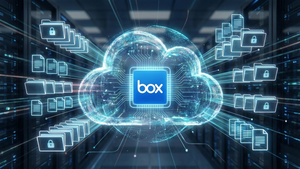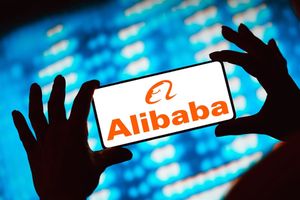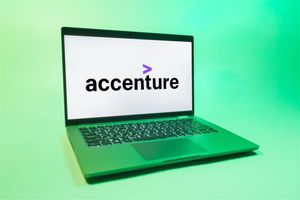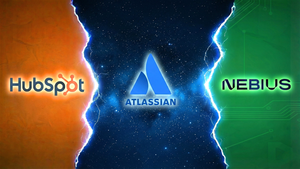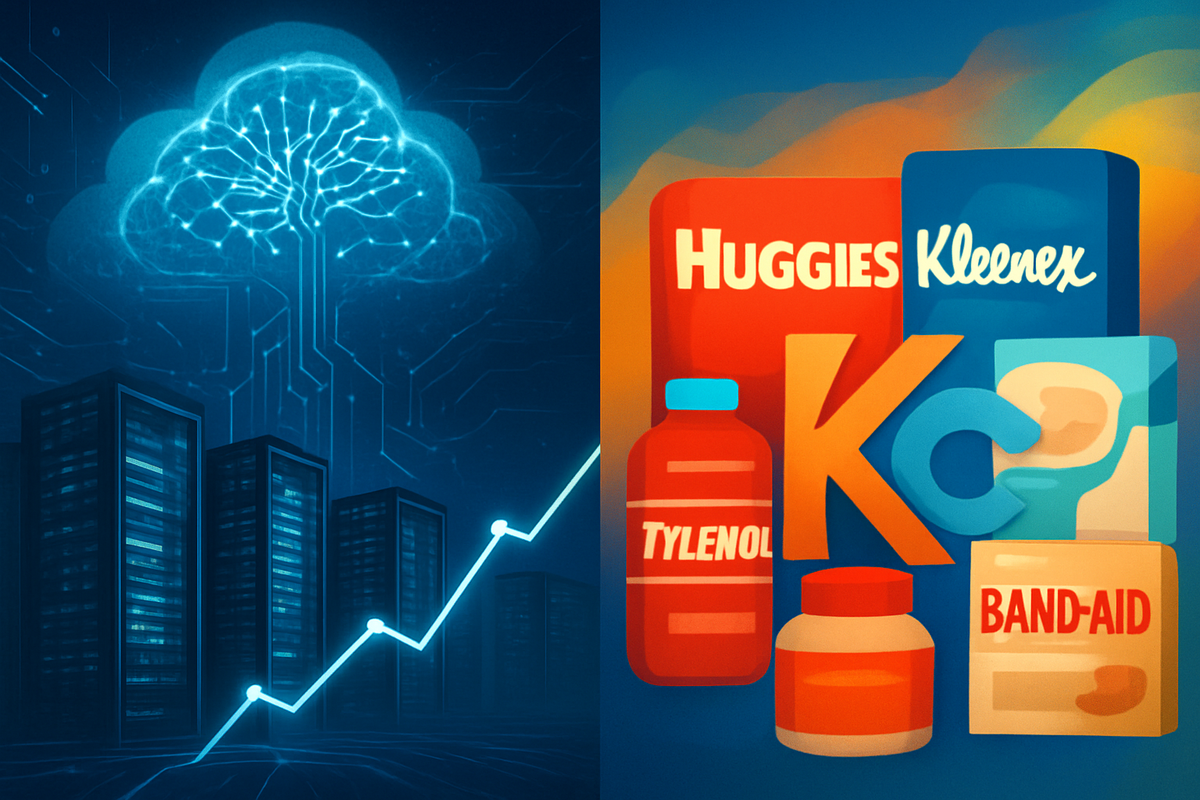
November 3, 2025, marks a pivotal day in the financial markets, witnessing two seismic corporate announcements that promise to redefine their respective industries. Amazon.com Inc. (NASDAQ: AMZN) has seen its stock surge following a monumental $38 billion cloud services deal with OpenAI, solidifying its position in the fiercely competitive artificial intelligence infrastructure race. Concurrently, Kimberly-Clark Corporation (NYSE: KMB) has unveiled an ambitious $48.7 billion acquisition of Kenvue Inc. (NYSE: KVUE), a move set to create a new global powerhouse in consumer health and wellness. These events, collectively valued at over $86 billion, are sending immediate ripples through investor confidence, market valuations, and the strategic trajectories of numerous public companies.
The Amazon-OpenAI deal, in particular, has injected a fresh wave of optimism into the tech sector, validating Amazon Web Services' (AWS) capabilities and potentially reshaping the landscape of AI development. Meanwhile, Kimberly-Clark's bold play for Kenvue signals a significant consolidation trend in consumer packaged goods, aiming for scale and diversified growth, albeit with an immediate negative reaction from its own shareholders concerned about the valuation and integration challenges. Both transactions underscore the dynamic nature of today's markets, where strategic alliances and aggressive M&A are key to securing future growth and competitive advantage.
A Deep Dive into the Deals Shaping Tomorrow's Industries
Amazon's $38 Billion Cloud Services Pact with OpenAI
Amazon Web Services (AWS) and OpenAI have formally announced a seven-year, $38 billion strategic partnership. This landmark agreement sees OpenAI leveraging AWS's advanced cloud infrastructure to power and scale its extensive artificial intelligence (AI) workloads, including its widely used ChatGPT applications and the training of its future, next-generation AI models. A critical component of the deal grants OpenAI access to Amazon EC2 UltraServers, equipped with hundreds of thousands of state-of-the-art Nvidia (NASDAQ: NVDA) GPUs, specifically GB200 and GB300 AI accelerators. The agreement also provides the flexibility to expand to tens of millions of CPUs, ensuring robust computing power for OpenAI's demanding AI operations. AWS expects to deploy the initial capacity for OpenAI's needs by the end of 2026, with provisions for further expansion into 2027 and beyond.
The timeline leading to this moment has been marked by OpenAI's strategic diversification of its cloud resources. Building on an existing relationship where OpenAI's open-weight foundation models became available on Amazon Bedrock earlier in 2025, this deal follows a recent restructuring of OpenAI that granted it greater autonomy in choosing cloud providers. Previously, OpenAI had a highly integrated partnership with Microsoft (NASDAQ: MSFT), which held a right of first refusal for OpenAI's cloud compute needs. Just last week (late October 2025), OpenAI and Microsoft renegotiated their agreement, with OpenAI committing to purchase an additional $250 billion in Microsoft Azure services, while simultaneously gaining the freedom to diversify its cloud infrastructure. This strategic pivot to utilize multiple cloud providers, reportedly including Google (NASDAQ: GOOGL) and Oracle (NYSE: ORCL) with multi-billion dollar commitments, highlights its immense and growing computational demands. Key players include AWS CEO Matt Garman, OpenAI co-founder and CEO Sam Altman, and Nvidia as the crucial hardware provider. Initial market reactions were highly positive for Amazon (NASDAQ: AMZN), with its stock seeing a notable increase between 5% and 6% in early trading, and Nvidia (NASDAQ: NVDA) shares climbing nearly 3%.
Kimberly-Clark's $48.7 Billion Acquisition of Kenvue
Kimberly-Clark Corporation has announced its definitive agreement to acquire all outstanding shares of Kenvue Inc. in a cash-and-stock transaction valued at approximately $48.7 billion. Under the terms of the deal, Kenvue shareholders are set to receive $3.50 per share in cash along with 0.14625 Kimberly-Clark (NYSE: KMB) shares for each Kenvue (NYSE: KVUE) share they hold at closing, equating to a total consideration of $21.01 per share. Upon the transaction's completion, current Kimberly-Clark shareholders are projected to own approximately 54% of the combined entity, with Kenvue shareholders holding the remaining 46%. The merger aims to create a formidable leader in the global health and wellness market, bringing together Kimberly-Clark's prominent brands like Huggies and Kleenex with Kenvue's expansive portfolio, which includes Tylenol, Band-Aid, Listerine, Neutrogena, and Aveeno. Kimberly-Clark anticipates achieving approximately $2.1 billion in annual cost synergies from the acquisition. The acquisition is expected to finalize in the second half of 2026, pending approval from both companies' shareholders and various regulatory bodies.
The timeline leading to this acquisition began with Johnson & Johnson's (NYSE: JNJ) strategic decision in November 2021 to spin off its consumer health business, which was officially named Kenvue (NYSE: KVUE) in September 2022. Kenvue completed its Initial Public Offering (IPO) in May 2023, and by August 2023, it became a fully independent company. More recently, in July 2025, Kenvue faced internal changes, including the departure of CEO Thibaut Mongon, with Kirk Perry stepping in as interim CEO. In September 2025, Kenvue's brand, particularly Tylenol, faced public scrutiny following unsubstantiated claims from public figures. Key players include Kimberly-Clark CEO Mike Hsu, who is slated to become Chairman and CEO of the combined entity, and Kenvue interim CEO Kirk Perry. Initial market reactions were starkly different for the two companies: Kenvue (NYSE: KVUE) shares surged approximately 19-20% in premarket trading, while Kimberly-Clark's (NYSE: KMB) stock faced a significant downturn, falling nearly 15-16%, indicating investor concerns about the high valuation of the deal.
Who Wins and Who Loses in the New Market Landscape?
Impact of Amazon-OpenAI Deal
Winners:
- Amazon Web Services (AWS): AWS (NASDAQ: AMZN) is a clear winner, securing a massive, long-term revenue stream and a high-profile client in OpenAI. This deal validates AWS's advanced compute capabilities and solidifies its position as a dominant force in the AI cloud market, easing previous investor concerns about its standing in the AI race. The immediate 6% jump in Amazon's shares reflects this renewed confidence.
- Nvidia (NASDAQ: NVDA): As the primary supplier of the high-performance GPUs crucial for AI model training and operation, Nvidia stands to benefit immensely. The agreement specifically involves the delivery of Nvidia GB200 and GB300 AI accelerators, ensuring continued high demand for its hardware. Nvidia shares rose 3% following the announcement.
- OpenAI: This deal is a significant win for OpenAI, granting them the massive scale and reliable compute resources needed to push the boundaries of AI, including current operations like ChatGPT inference and future model training for technologies like GPT-5. It also represents a strategic move to diversify its cloud provider portfolio, reducing dependence on any single provider.
Losers:
- Microsoft Azure (NASDAQ: MSFT): While Microsoft (NASDAQ: MSFT) remains a significant partner with a $250 billion commitment from OpenAI, this AWS deal signals OpenAI's diversification strategy. Microsoft is no longer OpenAI's sole or exclusive cloud provider, leading to a brief dip in Microsoft's shares upon the announcement and intensifying competition for future AI workloads.
- Google Cloud (NASDAQ: GOOGL): Although OpenAI also has an agreement with Google Cloud, facilitated by CoreWeave, for access to Google's custom-built AI processors (TPUs), the AWS deal represents a larger, more encompassing commitment for OpenAI's core AI infrastructure. This intensifies the competition in the AI infrastructure market for Google (NASDAQ: GOOGL).
- Other Smaller Cloud Providers: The sheer scale of this $38 billion investment underscores that access to cutting-edge compute is becoming a critical differentiator. This could create higher barriers to entry and make it harder for smaller cloud providers to compete for frontier AI companies' business, as they might not be able to offer infrastructure at this scale.
Impact of Kimberly-Clark-Kenvue Acquisition
Winners:
- Kenvue Shareholders (NYSE: KVUE): Kenvue (NYSE: KVUE) shareholders are clear winners, as the acquisition offers a significant premium over Kenvue's recent trading price. They will receive $3.50 per share in cash plus 0.14625 Kimberly-Clark (NYSE: KMB) shares for each Kenvue share, totaling $21.01 per share based on Kimberly-Clark's October 31 closing price. Kenvue's stock soared nearly 20% in premarket trading after the announcement.
- Kimberly-Clark (NYSE: KMB): Kimberly-Clark (NYSE: KMB) will significantly expand its portfolio by integrating Kenvue's strong consumer health brands, including Tylenol, Neutrogena, Band-Aid, Listerine, Benadryl, and Aveeno, with its own iconic brands like Huggies and Kleenex. This creates a combined entity with approximately $32 billion in annual revenue and 10 billion-dollar brands, allowing Kimberly-Clark to position itself as a global health and wellness leader. The company anticipates realizing approximately $2.1 billion in total run-rate synergies.
Losers:
- Kimberly-Clark Shareholders (NYSE: KMB): While strategically beneficial long-term, Kimberly-Clark's (NYSE: KMB) shares dropped significantly (12-16%) following the announcement. This decline reflects investor concern over the hefty price tag, the large size of the investment, potential short-term financial pressure, and integration risks. The acquisition also comes as Kenvue has faced recent challenges, including declining sales and legal risks related to its Tylenol product line.
- Competing Consumer Health Companies: The creation of a larger, more diversified consumer health and personal care giant will intensify competition in the market. Companies like Procter & Gamble (NYSE: PG), Unilever (NYSE: UL), and Reckitt Benckiser (LSE: RKT) will face a formidable rival with an expanded portfolio of leading brands and enhanced capabilities.
- Kenvue's Previous Standalone Prospects: Kenvue (NYSE: KVUE), spun off from Johnson & Johnson (NYSE: JNJ) in 2023, had struggled to maintain momentum as a standalone company, facing activist investor pressure and disappointing financial results. While the acquisition is a win for its shareholders, it signifies that its path as an independent entity was fraught with difficulties.
Wider Significance and Market Repercussions
Amazon-OpenAI: Reshaping the AI Infrastructure Landscape
The $38 billion AWS-OpenAI deal represents a critical evolution in the AI and cloud computing sectors, moving beyond traditional client-vendor relationships to deep strategic alignment. This partnership directly reflects the exploding demand for massive, reliable compute power to train and run increasingly sophisticated AI models. It underscores a broader industry trend where AI development is heavily reliant on advanced cloud infrastructure, transforming cloud providers from mere service providers into pivotal enablers of AI innovation. The deal also highlights the ongoing arms race among tech giants to secure top-tier AI capabilities and talent, with cloud providers aggressively investing in specialized hardware like Nvidia (NASDAQ: NVDA) GPUs and custom AI chips.
The deal intensifies competition in the cloud market, particularly for AI workloads. While Microsoft Azure (NASDAQ: MSFT) remains a significant partner for OpenAI, this new agreement with AWS (NASDAQ: AMZN) diversifies OpenAI's infrastructure, reducing its sole reliance on Microsoft. This could pressure Google Cloud (NASDAQ: GOOGL) and Oracle Cloud (NYSE: ORCL) to pursue even larger and more strategic partnerships with other leading AI companies to remain competitive. For OpenAI's rivals, such as Anthropic (which also has significant investment and infrastructure deals with Amazon), Google DeepMind, and Meta AI (NASDAQ: META), the Amazon-OpenAI deal emphasizes the critical need for robust and scalable cloud infrastructure. The explicit mention of hundreds of thousands of Nvidia GPUs reinforces Nvidia's dominant position in the AI chip market.
The sheer scale of this $38 billion deal, coupled with existing significant partnerships (e.g., Microsoft-OpenAI), raises potential antitrust concerns regarding market concentration in AI infrastructure and advanced AI models. Regulators globally, especially in the US and EU, may scrutinize such large alliances for their impact on competition, innovation, and potential barriers to entry for smaller AI startups. This partnership draws parallels with earlier foundational alliances in the tech industry, such as Microsoft's multi-billion dollar investment and partnership with OpenAI, which served as a blueprint. The Amazon-OpenAI deal signifies a move towards a "multi-cloud AI" strategy for leading AI developers, breaking away from exclusive arrangements.
Kimberly-Clark-Kenvue: A New Era of Consumer Health Consolidation
Kimberly-Clark's (NYSE: KMB) acquisition of Kenvue (NYSE: KVUE) exemplifies the ongoing trend of consolidation within the consumer packaged goods (CPG) and consumer health sectors. Companies are seeking scale, diversified portfolios, and enhanced market share to achieve cost efficiencies, bolster pricing power, and better navigate evolving consumer preferences and supply chain complexities. The merger aims to create a leader in health and wellness, leveraging secular growth trends as consumers increasingly prioritize health. The deal also follows Kenvue's recent struggles, including a CEO departure and stock market declines, potentially making it an attractive target for acquisition.
The combined entity will become a formidable force, bringing together Kimberly-Clark's Huggies, Kleenex, and Scott lines with Kenvue's Tylenol, Band-Aid, Listerine, Neutrogena, and Aveeno brands. This will intensify competition for major players like Procter & Gamble (NYSE: PG), Unilever (NYSE: UL), and Reckitt Benckiser (LSE: RKT), particularly in categories where the combined company gains significant market share. Competitors may respond with their own M&A activities, increased marketing spend, or accelerated innovation to defend their positions. For major retailers, the combined company will represent a larger, more influential supplier, potentially leading to both opportunities for streamlined negotiations and challenges related to increased leverage by the merged entity.
Given the size and scope of the combined entity, the acquisition will face significant antitrust scrutiny from regulatory bodies, including the Federal Trade Commission (FTC) and Department of Justice (DOJ) in the US, as well as authorities in the European Union and other major markets. Regulators will assess potential overlaps in product categories and geographic markets to ensure the deal does not unduly reduce competition or harm consumer choice and pricing. This acquisition can be compared to other mega-mergers in the CPG and pharmaceutical industries, such as Procter & Gamble's (NYSE: PG) acquisition of Gillette, aimed at building scale and diversifying product portfolios. The context of Kenvue being a recent spin-off from Johnson & Johnson (NYSE: JNJ) adds another layer, as the acquisition reverses some of the recent industry trend of divestitures to focus on core businesses.
The Road Ahead: Navigating Opportunities and Challenges
What Comes Next for Amazon and the AI Landscape
The $38 billion AWS-OpenAI deal, announced on November 3, 2025, sets the stage for significant developments in the AI and cloud computing sectors. In the short term, AWS (NASDAQ: AMZN) will experience an immediate revenue boost and enhanced leadership in AI infrastructure, solidifying its ability to handle massive, complex AI workloads. Amazon will likely gain invaluable insights into running frontier AI models at scale, allowing for further optimization of its services and hardware. This deal also strategically positions AWS against Microsoft Azure (NASDAQ: MSFT), as OpenAI diversifies its cloud providers.
Long-term possibilities include deepened AI expertise and innovation for Amazon, potentially fostering collaboration and knowledge sharing that enables the development of more sophisticated in-house AI offerings. Amazon's multi-pronged approach, including its investment in Anthropic, reduces reliance on a single AI partner. The massive infrastructure built for OpenAI could eventually be leveraged for Amazon's own foundational models and AI-powered products. Strategic pivots will involve carefully balancing relationships with competing AI partners like OpenAI and Anthropic, continued investment in custom AI hardware (like its Trainium and Inferentia processors) to reduce reliance on external GPU providers, and enhanced security and compliance. Market opportunities include cementing dominance in AI infrastructure and cross-pollination of innovation, while challenges include intense competition from other hyperscalers and the significant capital expenditure required.
Potential scenarios include AWS becoming the undisputed leader in AI cloud, increased vendor lock-in for OpenAI due to deep integration, Amazon accelerating its own foundational model development, or heightened regulatory scrutiny due to the concentration of AI compute power.
What Comes Next for Kimberly-Clark and the Consumer Health Market
Kimberly-Clark's (NYSE: KMB) acquisition of Kenvue (NYSE: KVUE), expected to close in the second half of 2026, ushers in a period of intense integration and strategic repositioning. In the short term (post-closing), the focus will be on the complex task of integrating two large organizations, their product portfolios, supply chains, and cultures. Kimberly-Clark will prioritize realizing the projected $2.1 billion in annual cost savings through optimizing manufacturing, procurement, and administrative functions. There may also be a short-term review of the combined brand portfolio to identify overlapping or underperforming brands. The market will closely watch initial integration progress and financial results, and Kimberly-Clark will need to navigate existing legal and reputational issues inherited from Kenvue, such as claims regarding Tylenol.
Long-term possibilities point to the creation of a global consumer health powerhouse with a vast array of iconic brands, potentially leading to enhanced market power and distribution. The merger could pool resources for increased investment in R&D and innovation, leading to new product introductions. Opportunities will emerge for cross-selling products across existing distribution channels and leveraging the combined geographic footprint for market expansion. Strategic pivots will include sophisticated brand management and segmentation, optimizing integrated global supply chains, and carefully managing talent integration. Market opportunities include category leadership and synergistic growth, while challenges include the significant debt load from the acquisition, inherent integration risks, and the need to stay agile amidst evolving consumer trends and competitive pressures.
Potential scenarios include seamless integration and significant value creation, integration headwinds leading to underperformance, strategic divestitures to optimize the portfolio, or an increased focus on healthcare professionals to leverage Kenvue's existing relationships.
Comprehensive Wrap-Up: A Reshaped Future
The financial events of November 3, 2025, featuring Amazon's (NASDAQ: AMZN) colossal cloud deal with OpenAI and Kimberly-Clark's (NYSE: KMB) ambitious acquisition of Kenvue (NYSE: KVUE), underscore a market in flux, driven by both technological advancement and strategic consolidation. These deals, totaling over $86 billion, are not merely financial transactions; they are strategic maneuvers that will redefine industry structures, competitive dynamics, and the future trajectories of the involved companies.
For Amazon (NASDAQ: AMZN), the $38 billion OpenAI deal solidifies AWS's (NASDAQ: AMZN) critical role as an enabler of frontier AI, diversifying OpenAI's cloud dependency and validating Amazon's massive investments in AI infrastructure. This move intensifies the "AI arms race" among hyperscale cloud providers, making access to high-performance computing a paramount strategic resource. The lasting impact will be a more robust, multi-cloud AI ecosystem, but also potential regulatory scrutiny over market concentration and the sustainability of such immense capital expenditures.
Kimberly-Clark's (NYSE: KMB) $48.7 billion acquisition of Kenvue (NYSE: KVUE) represents a significant consolidation in the consumer health sector. This merger creates a global powerhouse with an expansive portfolio of iconic brands, aiming for substantial synergies and enhanced market share. While promising long-term growth and increased pricing power, the immediate negative market reaction to Kimberly-Clark's stock highlights investor concerns about the hefty price tag and the inherent complexities and risks of integrating such a large entity, especially one with recent operational and legal challenges.
Moving forward, investors should closely monitor several key areas. For Amazon (NASDAQ: AMZN), watch for continued capital expenditure announcements in AI infrastructure, the profitability of these massive cloud contracts, and how AWS leverages its partnerships to attract other AI clients. The development of proprietary AI chips and the broader energy consumption implications of expanding data centers will also be crucial. For Kimberly-Clark (NYSE: KMB), the success of the integration process and the realization of the projected $2.1 billion in synergies will be paramount. Investors should also track the combined company's ability to maintain and grow market share in a competitive consumer environment, as well as the resolution of any ongoing legal challenges related to Kenvue's products. The strategic use of digital and AI technologies in both product development and consumer engagement will be vital for long-term growth across both newly formed landscapes.
This content is intended for informational purposes only and is not financial advice
